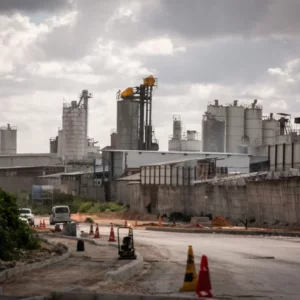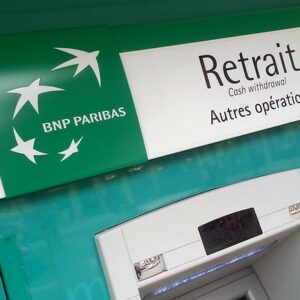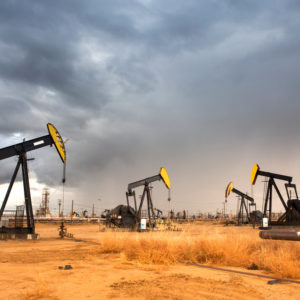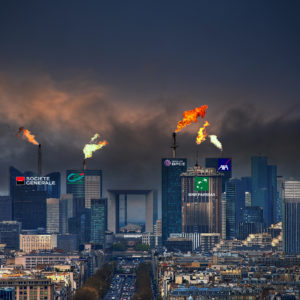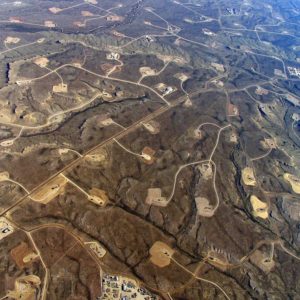
« Mustang » contract: Engie secretly signs a new contract to import fracked gas in France
Revelations on a new shale fracked contract signed in secret by Engie.
While the international press recently made public the signature by Engie of a new shale gas purchase contract during the summer of 2021 1, confidential internal documents 2 obtained by Friends of the Earth France and revealed by Le Monde 3 point to environmental and climatic risks ignored by the French group. They also strongly suggest that Engie deliberately kept silent about the negotiations and the signature of this contract, known within the company by the code name « Mustang ». Friends of the Earth France calls on Engie and its investors, including the French State, to stop fuelling the expansion of oil and gas.
According to these sources, the contract signed on July 23 between Engie and the US company Cheniere provides for the purchase, between 2021 and 2032, of around 100 cargoes of liquefied gas (LNG), largely if not exclusively sourced in shale gas basins 4. The cargoes would then be exported via the Corpus Christi LNG terminal in Texas 5 to the European market, via the ports of Montoir-de-Bretagne in France and Barcelona in Spain. Le Monde states that the total amount of the transaction is estimated at 1.896 billion dollars, or more than 1.6 billion euros.
A contract deliberately kept secret?
The existence of this contract was only revealed on November 11, 2021 by the financial media S&P Global 1, almost 4 months after it was signed and a year after discussions with Cheniere began, according to the documents consulted. The radio silence around the contract does not appear to be a coincidence: all indications are that Engie intentionally made sure that its existence was not made public. The very use of the code name « Mustang » in the process of negotiating and validating the contract speaks volumes about the precautions taken by Engie. Above all, the internal documents to which Le Monde and Friends of the Earth France had access show that the decision on the signing of the contract was submitted in April 2021 to Engie’s Executive Committee with the explicit recommendation that, in the event of validation, « no publicity should be made around the transaction to keep it under the radar« .
A major question now arises: did Engie’s executive management deliberately hide the negotiations around this US LNG purchase contract from the French government – a 23% shareholder in the company – in order to avoid a repeat of the November 2020 scenario where, under pressure from the State, Engie was forced to abandon the signing of a similar contract with the company NextDecade 6? The documents obtained indicate that the committee in charge of monitoring the contract recommended to « inform the Chairman of the Board » – Jean-Pierre Clamadieu – of the ongoing negotiations and « get his feedback on potential next steps forward towards Board members« , which includes a director representing the French State 7. The government confirmed to Le Monde that it was not informed of the deal via the Board 3. Whether the government is complicit or ignorant, « Mustang » represents a new climate failure on its part, in its mandate as Engie’s main shareholder.
As events unfolded, it became clear that Engie had indeed managed to keep the contract under wraps, until a letter filed by Cheniere with the US Department of Energy was finally posted online by the federal authorities and identified by the press. A significant detail: in this letter, Cheniere expressly asked the authorities to guarantee the confidentiality of the contract [8]. Such treatment is not, however, the company’s usual practice: recent contracts signed by Cheniere were on the contrary the subject of immediate press releases – with Glencore and ENN in October, and with Sinochem in November 9. This again suggests that Cheniere and Engie have been consciously, actively and for as long as possible trying to hide the existence of this agreement from the public.
For Lorette Philippot, campaigner at Friends of the Earth France: « Engie seems to have learned from the contract abandoned in the fall of 2020 with the company NextDecade, but the lessons learned are not the right ones: rather than taking note of the fact that betting on gas, and in particular shale gas, is incompatible with the climate emergency and the energy transition, Engie only seems to have learned that it was necessary to be more discreet in order to escape citizen vigilance and public pressure. But the importation in France, and by a company in which the State is a shareholder, of ever more shale gas cannot be decided by a few people behind closed doors, without the scrutiny of citizens, MPs, and of even the government. «
Environmental and climate risks: a contract signed blindly by Engie
This new gas purchase contract from Engie has severe climate consequences. On the one hand, a transaction of this magnitude inevitably contributes to pushing upstream shale gas exploitation. The International Energy Agency (IEA) has recognized and repeated that developing new fossil fuel resources is incompatible with the objectives of the Paris Agreement. The gas imported by Engie will largely, if not exclusively, come from shale basins near Corpus Christi LNG – such as the Eagle Ford shale and the Permian Basin – [5], whose growth alone threatens the global climate. Exponential production in the Permian Basin could for example consume nearly 10% of the world’s remaining carbon budget to stay below the critical +1.5°C threshold 10.
Moreover, from the US extractive basins to the French pipelines, the transport of this gas will inevitably be responsible for significant methane leaks 11. Finally, the environmental analysis contained in Engie’s internal documents specifies that this gas will not replace other sources of fossil fuels, nipping in the bud the argument too often brandished of a so-called climate benefit of gas.
Faced with this major risk, Engie only mentions in its internal note that Cheniere has committed to assess the GHG lifecycle of its LNG cargoes from 2022: the group therefore implicitly acknowledges having signed without knowing the climate impact of the contract and without even being able to guarantee the quality and results of the promised assessment.
While the environmental and health risks associated with shale gas and hydraulic fracturing are well known – particularly in France where this unconventional technique has been banned since 2011 – the confidential elements obtained on « Mustang » attest that the origin of the gas is unknown to Engie: this gas would be untraceable and could come indiscriminately from several US states and about 70 producers. The documents also state that Cheniere does not have any additional requirements for upstream gas sourcing in terms of GHG and water management, while stressing that this is a critical issue associated with the shale gas industry in the US. Engie thus seems to have no idea where, how and by who is extracted the shale gas it is committed to importing until 2032.
Lorette Philippot concludes: « Engie cannot claim to know the risks of this contract for the climate, ecosystems and health, let alone be able to prevent them. This is a serious breach of its duty of vigilance and a disgrace for this energy company which is making so much effort to green its image. It is also completely inconsistent when, just a year ago, the French State opposed the signing of a similar shale gas import contract, because of its environmental consequences. But acting in the shadows does not make the very real impacts of these activities disappear. »
S&P Global article, November 11, 2021.
These are confidential documents detailing the contract under negotiation, dated April 2021, and issued by ENGIE Global Energy Management.
The Corpus Christi LNG terminal is primarily supplied with gas from the Eagle Ford Shale. It is also likely that Cheniere will export gas from the Permian Basin through this Texas terminal. In addition, Cheniere has signed a contract to supply gas from the Permian Basin to its Corpus Christi Stage III expansion project, which is expected to be operational in 2024.
Cheniere could also deliver shale gas from its Sabine Pass LNG terminal in Louisiana, according to the contract documents, provided that Engie is informed.
Friends of the Earth France press release of November 2020 and article by Reteurs.
See the complete list of members sitting on the Board of Directors of Engie.
The letter states: « Cheniere Marketing and CCL hereby request confidential treatment of the SPA filed herewith, as it contains commercially sensitive information. »
According to the IPCC, methane is a GHG with a warming power 86 times greater than CO2 over a 20-year horizon.

